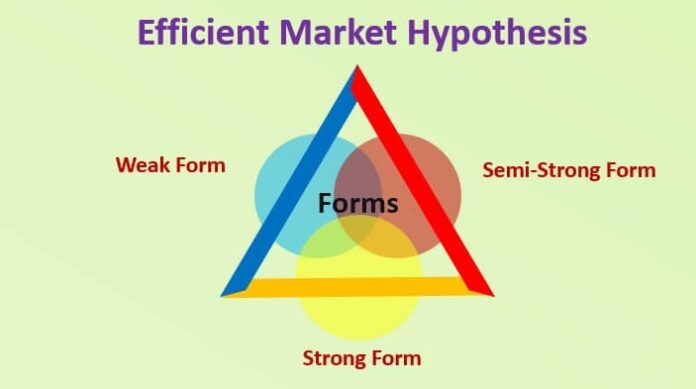The Efficient Market Hypothesis (EMH) is a financial economic theory stipulating that the financial markets reflect all available information on the price of assets at any given time.
Initially developed by economist Eugene Fama in the ‘60s, the theory states that it is nearly impossible for investors to gain an edge over the market in the long run.
Assets will be valued at their fair price, as all known information will be traded on until it ceases to be useful.
Strength of Information
When speaking of efficient markets, theorists distinguish between three levels of available information: weak, semi-strong, and strong.
Weak
Weak implies that current prices take into account all historical data, and, consequently, that technical analysis is irrelevant.
However, it omits other kinds of information and does not reject the notion that methods like fundamental analysis or extensive research can be used to gain an edge.
Semi-Strong
The semi-strong form dictates that all public information has already been factored into the price (news, statements by companies, etc.).
As such, proponents of this branch believe that even fundamental analysis cannot yield any advantage. The only way to gain an advantage over the market is to exploit private information, which is not yet known to the public.
Strong
Strong form holds that all public and private information is reflected in an asset’s price – on top of historical performance and public information, any data available to insiders, too, will be taken advantage of.
This form holds that there is no conceivable way for any market participant to gain an edge with any type of information, as the market will already have taken it into account.
EMH is Controversial
EMH is a long-established theory, but it isn’t without its critics.
Empirical data has not properly proven or disproven the validity of the hypothesis, but many opponents believe there to be a plethora of emotional factors at play that cause the undervaluation or overvaluation of financial assets.
Although it is a cornerstone of modern financial theory, the EMH is highly controversial and often disputed.
Proponents of the Efficient Market Hypothesis conclude that, because of the randomness of the market, investors could do better by investing in a low-cost, passive portfolio.
Opponents of EMH believe that it is possible to beat the market and that stocks can deviate from their fair market values.
Theoretically, neither technical nor fundamental analysis can produce risk-adjusted excess returns (alpha) consistently, and only inside information can result in outsized risk-adjusted returns.
If you liked this article, then please subscribe to our Newsletter Services for Forex Related updates. You can also find us on Facebook and can subscribe to our YouTube channel. You can also join our Telegram Channel for real-time trading analysis and discussion. Here is our service sitemap. If you have any confusion please leave your comments below.
































